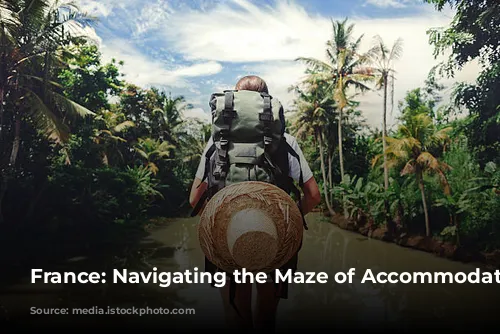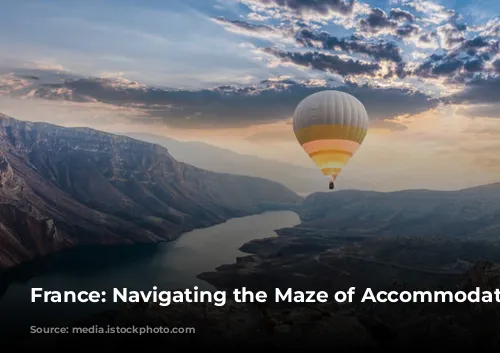France is a tourism powerhouse, attracting visitors from all corners of the globe. To cater to this diverse clientele, the country has a wide array of accommodation options, each governed by specific rules and regulations. This article will delve into the complexities of these categories, shedding light on their distinct characteristics and associated obligations.

Navigating the Legal Landscape: A Variety of Accommodation Options
The diverse nature of accommodation offerings in France can be both a blessing and a curse. While it provides tourists with ample choice, it also presents a challenge for those entering the hospitality industry. Navigating the intricate web of regulations associated with each category can be daunting. Let’s explore these categories in detail, starting with a common player – the small hotel.

Small Hotels: Balancing Comfort and Safety
Small hotels, defined as those accommodating a maximum of 100 people, are subject to specific regulations, albeit lighter than their larger counterparts. These regulations aim to strike a balance between ensuring safety and minimizing bureaucratic burdens.
Easing the Burden: A Focus on Smaller Structures
Initially, the safety standards for small hotels were deemed overly stringent for very small establishments. Recognizing this challenge, a revised regulation was introduced in 2011, offering simplified guidelines for hotels accommodating less than 20 people. This revision aims to promote flexibility while maintaining basic safety standards.
A Quick Look at the New Regulations
The simplified guidelines for very small hotels include provisions such as the installation of basic smoke detectors, eliminating the need to comply with the more comprehensive requirements outlined in the 2006 decree. This approach seeks to strike a balance between ensuring safety and promoting ease of operation for smaller businesses.

Guest Rooms: A Home Away From Home
Guest rooms offer a unique experience, blending the comfort of a home with the convenience of hotel-like amenities. These establishments are characterized by a personalized touch, often with the owner residing on-site, providing direct interaction and a welcoming atmosphere.
The Guest Room Experience: An Intimate Setting
Guest rooms are typically limited to a maximum of 5 rooms and 15 guests, maintaining a sense of intimacy. The daily cleaning of rooms and bathrooms, included in the price, contributes to the overall experience.
The “Table d’Hôtes”: A Culinary Delight
Adding to the charm, some guest rooms offer a delightful culinary experience known as the “table d’hôtes”. This unique service is not a restaurant but a complementary offering reserved solely for guests, featuring a shared meal with the host, often centered around a single, carefully crafted menu.

“Meublés de Tourisme”: Furnished Tourist Accommodation
“Meublés de tourisme”, which translates to “furnished tourist accommodation,” encompass a diverse range of options, including villas, apartments, “gîtes” (rural cottages), and furnished studios. They offer a more independent and self-sufficient vacation experience, often appealing to those seeking a home-like environment.
A Spectrum of Options: Meeting Diverse Needs
“Meublés de tourisme” are offered for rent to short-term visitors, allowing for daily, weekly, or monthly stays. They are classified by a star rating system, with the number of stars reflecting the level of comfort and amenities provided.
Seasonal Stays: A Focus on Short-Term Rentals
“Meublés de tourisme” are typically considered seasonal accommodations, with a 90-day or 12-week limit on rentals to the same individual. This rule ensures a constant flow of visitors and encourages a diverse clientele.
Strict Standards: Ensuring Quality
To earn the classification of “meublé de tourisme classé,” establishments must undergo a thorough inspection process. This includes an assessment of the accommodation’s overall comfort, layout, and equipment, with the classification ranging from 1 to 5 stars based on the findings.

Safety and Accessibility: A Focus on Well-being
France prioritizes safety and accessibility in all accommodation categories. The safety regulations for small hotels have been revised in recent years, and regular maintenance checks are mandated to ensure the proper functioning of essential systems and equipment.

Small Hotels: A Detailed Look at Safety Regulations
Safety regulations for small hotels encompass a range of measures, including regular checks of electrical installations, heating, air conditioning, elevators, cooking appliances, fire extinguishers, and other safety systems. The aim is to create a secure environment for both guests and staff.

Staff Training: Ensuring Preparedness
Staff training is crucial in ensuring a safe environment. Small hotel staff must participate in regular training sessions covering fire safety, evacuation procedures, and other relevant safety measures. These training sessions aim to equip staff with the knowledge and skills needed to handle emergencies effectively.

Guest Room Safety and Accessibility
Guest rooms, though typically exempt from specific accessibility regulations, must meet minimum standards if they exceed the capacity limits of 5 rooms and 15 people. In such cases, they are subject to the same regulations as hotels and other public establishments, ensuring accessibility for all.

“Meublés de Tourisme”: Safety and Accessibility
“Meublés de tourisme”, while not subject to specific accessibility regulations, must meet the minimum standards set for decent housing. This includes basic safety measures, such as the installation of smoke detectors.

Ensuring Compliance: A Shared Responsibility
The responsibility for ensuring compliance with safety regulations is shared between owners and operators, with the owner bearing primary responsibility for seasonal accommodations. It is essential for owners and operators to understand their obligations and to maintain a commitment to safety and accessibility.

Conclusion: A Guide to Accommodation Options in France
France offers a diverse range of accommodation options, each with its own set of rules and regulations. Understanding these regulations is crucial for both tourists and those entering the hospitality industry. From small hotels to guest rooms and “meublés de tourisme,” France prioritizes safety, accessibility, and a high standard of service. This comprehensive guide provides a roadmap for navigating the complex landscape of accommodation categories in France, ensuring a safe and enjoyable experience for all.



